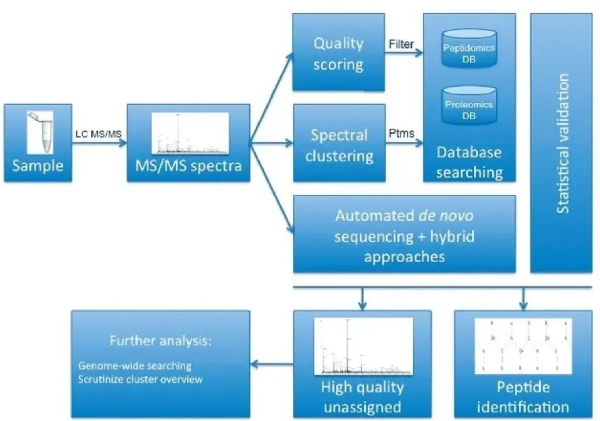PeptideMassSpectrometry is a powerful and widely used bioanalysis technology that brings scientists a window into the structure and function of living molecules. This technique provides important information on the sequence, structure, and interaction of proteins, peptides, and other biomolecules by converting polypeptide molecules into ions and measuring their mass-to-charge ratios.
The importance of peptides and the rise of mass spectrometry
A polypeptide is a biological molecule composed of two or more amino acids linked by a peptide bond. It plays an important role in cells and is added to many biochemical processes in life. Understanding the sequence and structure of peptides is particularly important for understanding protein function, drug development, and disease mechanisms. The rise of PeptideMassSpectrometry technology provides an effective and sensitive method for scientists to reveal the mysteries of these tiny biomolecules.
The basic principle of PeptideMassSpectrometry
PeptideMassSpectrometry technology is based on the principle of mass spectrometer and mainly consists of four main processes: ionization, acceleration, sailing and inspection. First, the peptide sample is converted to an ionic state after ion treatment, generally using an ionization source in a mass spectrometer (such as an electrospray ion source or a matrix-assisted laser analysis ionization source). Next, the energized polypeptide ion is accelerated in the electric field, gaining a certain kinetic energy. The polypeptide then enters the navigation chamber and sails according to its mass/charge ratio. Finally, the detector measures the arrival time of the polypeptide to determine its mass/charge ratio and generate a mass spectrogram.
The application of PeptideMassSpectrometry
Protein identification and quantification: PeptideMassSpectrometry can be used to identify proteins in complex mixtures. The presence and relative abundance of proteins can be determined by digestion of proteins into peptides followed by mass spectrometry techniques.
Biomarker research: PeptideMassSpectrometry is widely used in the biomedical field to find biomarkers of diseases to aid in initial diagnosis and treatment.
Drug research and development: In drug research and development, PeptideMassSpectrometry can be used to study drug metabolism, drug efficacy and drug interaction with biomolecules, providing important information for drug design and improvement.
Protein structure research: PeptideMassSpectrometry technology plays an important role in revealing protein structure and structural dynamics, which is beneficial to understand the functional mechanism of proteins.
Future Perspectives
With the continuous progress and optimization of mass spectrometry technology, PeptideMassSpectrometry will continue to play a key role at the forefront of life science research. The introduction of more and more new technologies and methods also provides scientists with more comprehensive and effective means of peptide analysis. The future of PeptideMassSpectrometry will have broader prospects in deepening our understanding of biomolecules, facilitating medical research and facilitating new drug research. The steady development of this technology will continue to open up a wonderful journey for scientists to explain the code of life.
Post time: Jan-05-2024

